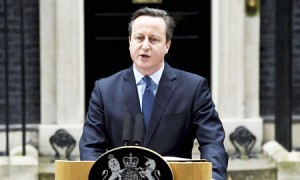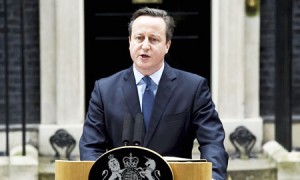The Guardian
Editorial
 There were the expected delays – an English breakfast that turned to lunch, then high tea, then dinner – but David Cameron was able on Friday night to announce his deal with the European Union, earlier than many expected. It has not fundamentally reshaped Britain’s relationship with the EU in the way that he has always claimed to want to do but he has secured some significant concessions relating to that relationship. It is a deal pro-Europeans from across the political spectrum must rally behind.
There were the expected delays – an English breakfast that turned to lunch, then high tea, then dinner – but David Cameron was able on Friday night to announce his deal with the European Union, earlier than many expected. It has not fundamentally reshaped Britain’s relationship with the EU in the way that he has always claimed to want to do but he has secured some significant concessions relating to that relationship. It is a deal pro-Europeans from across the political spectrum must rally behind.
The road has been rocky: Cameron promised a referendum in the Conservative manifesto as a concession to Eurosceptics in his own party and to try to neutralise the Ukip threat. Having won a majority, he had to see it through. Using international diplomacy to manage internal party tensions was always a risky strategy, although the Tory Eurosceptic boil arguably had to be lanced at some point. The later it was left, the more painful it would have become.
Cameron hasn’t always played his hand well. His decision to withdraw the Conservatives from the European People’s Party grouping of the European Parliament put his relationship with Angela Merkel on a tricky footing from the very start. He eroded trust by prematurely wielding a veto against a European treaty back in 2011. He certainly didn’t make his job to renegotiate a settlement for Britain any easier.
But Cameron deserves credit for the deal he has negotiated. It does not represent the fundamental reshaping of Britain’s relationship that he wanted. But he was naïve to think he would be able to get a more substantial renegotiation based on treaty reform this year, with French and German elections on the horizon and a treaty renegotiation on the timetable for 2017. Within the parameters of what was possible, Cameron has secured some concessions: the indexing of child benefit to living standards in countries where the children of EU migrant workers are living fixes an anomaly. Some, however, are purely symbolic: the amending of EU treaties to state explicitly that references to “ever-closer union” do not apply to the UK simply confirms what has already been true for decades. The risk for Cameron is that the terms he has negotiated do not address public concerns: an emergency brake on in-work benefits is very unlikely to put off workers from eastern Europe, particularly given the substantial increases to the minimum wage we will see over the next few years.
The more immediate question, of course, is whether it is enough to convince the large numbers of British people who are yet to make up their minds. Diplomatic breakfasts, indexed benefits and emergency brakes are hardly an area of fascination for any but the most dedicated EU junkies. Few members of the British public will have followed the minute-by-minute coverage from Brussels over the past week. Many may feel alienated by the process itself, with its attendant images of politicians arriving by limousine at the headquarters of remote institutions for obscure debates and large dinners.
The job of selling the deal has been made harder by Cameron’s gradual retraction from his initial position. In starting with treaty renegotiation, it was a mistake for him to talk up more than EU experts ever thought he could get. It makes the deal he has got harder to defend. He would have been better off starting with a more modest proposition, particularly given the fact that campaigners to leave would have strongly criticised anything short of hard limits on the freedom of movement principle itself. But only time will tell if the ammunition this has given to Brexiters is enough to affect the end result.
Of course, Cameron is but one player in how the debate will pan out. How other leading Conservatives choose to play this will be highly significant. Cameron is fortunate that senior – and previously Eurosceptic – backers from his cabinet such as Theresa May and Sajid Javid quickly rallied behind him. With Michael Gove the most senior Conservative MP to back the Out campaign so far, what Boris Johnson opts to do is likely to be important for its fortunes.The response of other political leaders could be just as significant. Nicola Sturgeon, one of the most formidable of the current generation of today’s politicians, has made her unambiguous support for staying in clear. In contrast, Jeremy Corbyn has to date been more equivocal. He has raised important questions. But in his role as leader of the opposition, he needs to make a principled and passionate case for the EU in the coming weeks, given what it has achieved for left principles such as social rights and international solidarity since the second world war. The extent to which Corbyn is able to rally Labour voters behind the Remain campaign could determine the result.
The British renegotiation also reveals much about the challenges facing Brussels. A deal was reached more quickly than expected given that Cameron was negotiating with 27 national leaders each facing a domestic political situation no less tricky than that of Britain: Merkel’s falling approval ratings; Hollande facing the rise of Marine Le Pen’s National Front; Tsipras managing the double fallout of the Euro and refugee crises; the Visegrad bloc looking to safeguard the rights of its citizens living abroad. This makes the agreement that Cameron was able to strike a more impressive feat. But the specificity of the British deal – other leaders were clear that it cannot be more generalised to other countries – belies the tricky years that lie ahead for Europe, with or without Britain involved. Broader or deeper: in the good economic times, the EU never had to pick. But it now faces new challenges. To survive, it has to become more flexible, otherwise the risk is that not just Britain, but other outliers, start to fall away. Deeper and narrower would be the wrong future for the EU. The deal has been done. It does not represent a fundamental shift in Britain’s relationship with the EU, but that was never on the table. Remain or leave: what the British public decide will be critical for Britain’s economic and social future. It is imperative we move away from the political drama of the last months to make a convincing public case for remaining in the EU.Yes, there are bigger questions facing the union as a whole: whether freedom of movement can maintain public legitimacy as the union expands; the future of currency union; the refugee crisis. But they won’t be answered in Britain’s referendum debate. Pro-Europeans must persuade the British public we need to remain in, so we can work alongside our European friends to shape the answers to those questions in the future.




